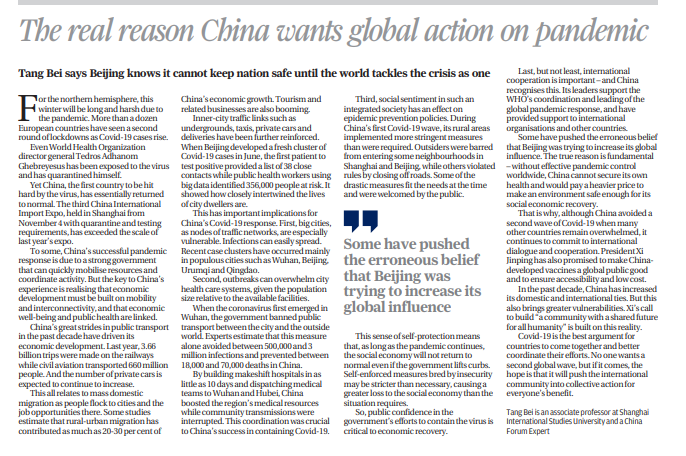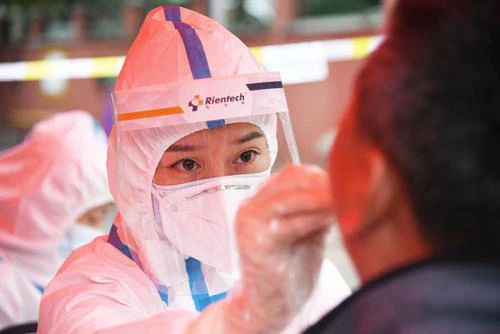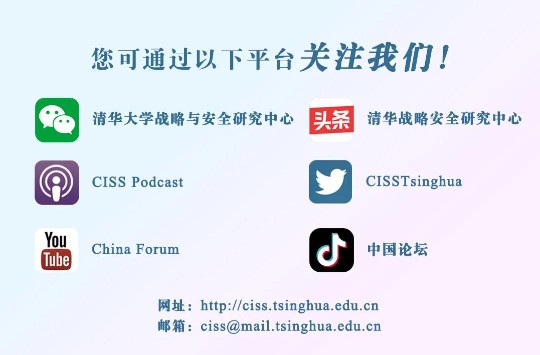编者按:
日前,《南华早报》刊发中国论坛特约专家、上海外国语大学副教授汤蓓的评论文章。汤蓓认为,中国支持多国抗疫,并非要寻求更大的影响力或所谓“疫苗外交”。相反,北京认识到,只有全世界团结一致,成功击退疫情,中国才能保障人民安全,保证经济复苏。清华大学战略与安全研究中心特将全文转发如下。(China’s support to other nations is not about seeking greater influence or vaccine diplomacy. Rather, Beijing knows it cannot keep its people safe or sustain economic recovery until the world battles the pandemic as one)
The real reason China is pushing for a better global response to the Covid-19 pandemic
Tang Bei is an associate professor at Shanghai International Studies University and a China Forum Expert

For the northern hemisphere, this winter will be long and harsh due to the pandemic. More than a dozen European countries have seen a second round of lockdowns as Covid-19 cases rise.
Even World Health Organization director general Tedros Adhanom Ghebreyesus has been exposed to the virus and has quarantined himself.
Yet China, the first country to be hit hard by the virus, has essentially returned to normal.
The third China International Import Expo, held in Shanghai from November 4 with quarantine and testing requirements, has exceeded the scale of last year’s expo, with some participants signing on for another three years.
To some, China’s successful pandemic response is due to a strong government that can quickly mobilise resources and coordinate activity. But the key to China’s experience is realising that economic development must be built on mobility and interconnectivity, and that economic well-being and public health are inextricably linked.
China’s great strides in public transport in the past decade have driven its economic development. Last year, 3.66 billion trips were made on the railways while civil aviation transported 660 million people. And the number of private cars is expected to continue to increase. A decade ago, there were 60 million on China’s roads; today that figure stands at more than 200 million.
This all relates to mass domestic migration as people flock to cities and the job opportunities there. Some studies estimate that rural-urban migration has contributed as much as 20-30 per cent of China’s economic growth. Tourism and related businesses are also booming.
Inner-city traffic links such as undergrounds, taxis, private cars and deliveries have been further reinforced. When Beijing developed a fresh cluster of Covid-19 cases in June, the first patient to test positive provided a list of 38 close contacts while public health workers using big data identified 356,000 people at risk. It showed how closely intertwined the lives of city dwellers are.
This has important implications for China’s Covid-19 response. First, big cities, as nodes of traffic networks, are especially vulnerable. Infections can easily spread to urban areas and lead to an outbreak. China’s recent case clusters have occurred mainly in populous cities such as Wuhan, Beijing, Urumqi and Qingdao.

Second, outbreaks can easily overwhelm city health care systems, given the population size relative to the available facilities. This is especially so as city outbreaks have a greater potential to accelerate.
When the coronavirus first emerged in Wuhan, the government banned public transport between the city and the outside world. Public health experts estimate that this measure alone avoided between 500,000 and 3 million infections and prevented between 18,000 and 70,000 deaths in China.
By building makeshift hospitals in as little as 10 days and dispatching medical teams to Wuhan and Hubei, China boosted the region’s medical resources while community transmissions were interrupted. This national-level coordination was crucial to China’s success in containing Covid-19.
Third, social sentiment in such an integrated society has an effect on epidemic prevention policies. During China’s first Covid-19 wave, its underdeveloped rural areas implemented more stringent measures than were required.
Outsiders were barred from entering some neighbourhoods in Shanghai and Beijing, while others violated rules by closing off roads. Some of the drastic measures fit the needs at the time and were welcomed by the public.
This sense of self-protection means that, as long as the pandemic continues, the social economy will not return to normal even if the government lifts restrictions. Self-enforced measures bred by insecurity may be irrational and stricter than necessary, causing a greater loss to the social economy than the situation requires.
So, public confidence in the government’s efforts to contain and control the virus is critical to economic recovery. In Qingdao, for example, after a handful of cases were reported, the government decided to administer nucleic acid tests to its more than nine million residents in less than one week.
Last, but not least, international cooperation is important – and China recognises this. Its leaders support the WHO’s coordination and leading of the global pandemic response, and have provided financial and material support to international organisations and other countries.
Some have pushed the erroneous belief that China was trying to increase its international influence. The true reason is fundamental – without effective pandemic control worldwide, China cannot secure its own health and would pay a heavier price to make an environment safe enough for its social economic recovery.
That is why, although China has avoided a second national wave of Covid-19 when many other countries remain overwhelmed, it continues to commit to international dialogue and cooperation. President Xi Jinping has also promised to make China-developed vaccines a global public good and to ensure their accessibility and low cost.
China has joined Covax, the global vaccine distribution alliance, and shared its Covid-19 experience with other countries, from Asia to Europe, offering suggestions on how to prevent simultaneous outbreaks of Covid-19 and influenza this autumn and winter.
In the past decade, China has increased its domestic and international ties. But this also brings greater vulnerabilities. Xi’s call to build “a community with a shared future for all humanity” is built on this reality.
Covid-19 is the best argument for countries to come together and better coordinate their efforts. No one wants a second global wave, but if it comes, the hope is that it will push the international community into collective action for everyone’s benefit.
本文原载于《南华早报》

